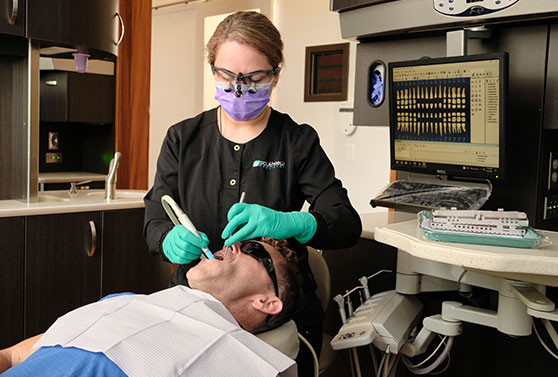Typical Concerns Concerning Oral Veneers Addressed
Oral veneers have actually ended up being an increasingly desired option for those wanting to boost their smiles, yet several individuals continue to be unclear about various aspects of their usage. Key questions commonly arise relating to the application procedure, longevity, and prospective dangers related to these aesthetic enhancements. In addition, the distinction in between porcelain and composite veneers can substantially influence one's choice. As we discover these usual questions, it becomes vital to take into consideration not just the benefits but likewise the ramifications of selecting dental veneers in search of a much more certain appearance. What factors should one weigh prior to making such a choice?
What Are Dental Veneers?
Oral veneers are thin, personalized coverings crafted from porcelain or composite resin that are created to cover the front surface area of teeth. These oral prosthetics serve both functional and aesthetic objectives, providing a remedy for different dental flaws, including staining, chips, voids, and imbalance. By adhering to the teeth, veneers can dramatically enhance the overall appearance of a smile, producing a more appealing and uniform appearance.
Porcelain veneers are especially preferred for their natural clarity and discolor resistance, making them an excellent choice for people looking for long-lasting results. In contrast, composite material veneers are generally more economical and can be used in a single check out, however they may not provide the exact same longevity as porcelain choices.
The choice to select dental veneers typically comes from a need for aesthetic enhancement, but patients must also take into consideration elements such as the long life of the product, maintenance requirements, and the prospective requirement for tooth reduction (Dental Veneers). Inevitably, dental veneers stand for a effective and functional option for achieving a radiant smile, accommodating private cosmetic requirements while promoting confidence and self-confidence
Just How Are Veneers Applied?
The application process for veneers needs mindful planning and precision to ensure optimal results. The procedure usually starts with an extensive examination, where the dental expert assesses the individual's dental health and wellness, reviews wanted outcomes, and figures out the ideal kind of veneers, whether porcelain or composite resin.
Once the therapy strategy is established, the dental professional prepares the teeth by eliminating a thin layer of enamel, generally about 0.5 mm to 1 mm, to suit the veneer. This step is important as it makes certain an appropriate fit and prevents the veneers from showing up large - Dental Veneers. After prep work, impacts of the teeth are required to develop custom-made veneers that match the patient's special dental structure and visual preferences
While the permanent veneers are being produced in a dental lab, short-term veneers may be positioned to shield the prepared teeth. As soon as the irreversible veneers are prepared, the dental practitioner will very carefully bond them to the teeth making use of a solid oral adhesive.
What Are the Advantages?

Moreover, veneers are known for their resilience and resistance to staining compared to all-natural teeth. Made from high-quality products such as porcelain or composite resin, they can maintain their appearance for many years their explanation with proper care. This longevity makes them a sensible investment in one's dental look.
Along with visual enhancements, veneers can likewise contribute to enhanced oral health. By covering harmed or compromised teeth, they can supply added support and security, assisting to avoid additional degeneration or wear and tear. This safety element can decrease the need for much more extensive oral treatments in the future.

For How Long Do They Last?
With proper treatment and maintenance, oral veneers can last anywhere from 10 to 15 years, making them a durable service for enhancing one's smile. The longevity of veneers largely depends on the material utilized, the top quality of the initial placement, and the person's adherence to oral hygiene techniques.
Porcelain veneers are understood for their longevity and resistance to staining, normally lasting closer to the 15-year mark when cared for appropriately. Compound veneers, while much more affordable, may require replacement quicker, often within 5 to one decade because of their sensitivity to use and discoloration.

Additionally, wearing a mouthguard throughout sporting activities or nighttime can offer extra defense. Inevitably, while veneers offer a considerable aesthetic improvement, their durability is substantially affected by the commitment to proper oral care and regular assessments with a dental professional.
Exist Any Type Of Risks?
Taking into consideration the transformative impacts of oral veneers, it's important to acknowledge the potential dangers related to their application. While veneers can improve the appearance of teeth, the procedure includes the removal of a thin layer of enamel, which can raise tooth sensitivity and susceptability to decay.
One substantial risk is the opportunity of improper placement or fitting, leading to discomfort, bite misalignment, or perhaps damage to the underlying tooth framework. In addition, if the veneers are not kept effectively, they can come to be stained or broken over time, requiring substitute.
Clients might also experience allergic reactions to the products utilized in the veneers, specifically if they have level of sensitivities to certain dental compounds. In addition, while veneers are durable, they are not unbreakable; extreme pressure from clinching or grinding can bring about imp source cracks.
It is essential for individuals to seek advice from a certified oral professional to evaluate their individual dangers and to follow aftercare instructions faithfully. By comprehending these risks, individuals can make enlightened decisions concerning their oral veneer therapy and make sure the long life and success of their improvements.
Verdict
In recap, oral veneers stand for an important cosmetic remedy for boosting smiles, with considerations concerning their application, benefits, longevity, and connected dangers. Their efficiency is affected by factors such as the option of product, Visit This Link with porcelain offering remarkable durability contrasted to composite options. Proper treatment and upkeep are necessary to make best use of the life expectancy of veneers. Ultimately, informed decision-making pertaining to oral veneers can bring about satisfying visual end results and boosted dental health.
Dental veneers are slim, tailor-made coverings crafted from porcelain or composite resin that are designed to cover the front surface area of teeth. After preparation, impressions of the teeth are taken to create customized veneers that match the person's distinct oral structure and visual choices.
While the irreversible veneers are being made in an oral laboratory, momentary veneers may be placed to protect the ready teeth. Once the irreversible veneers are all set, the dentist will thoroughly bond them to the teeth utilizing a solid oral adhesive. Ultimately, notified decision-making regarding dental veneers can lead to acceptable aesthetic outcomes and enhanced dental health and wellness.